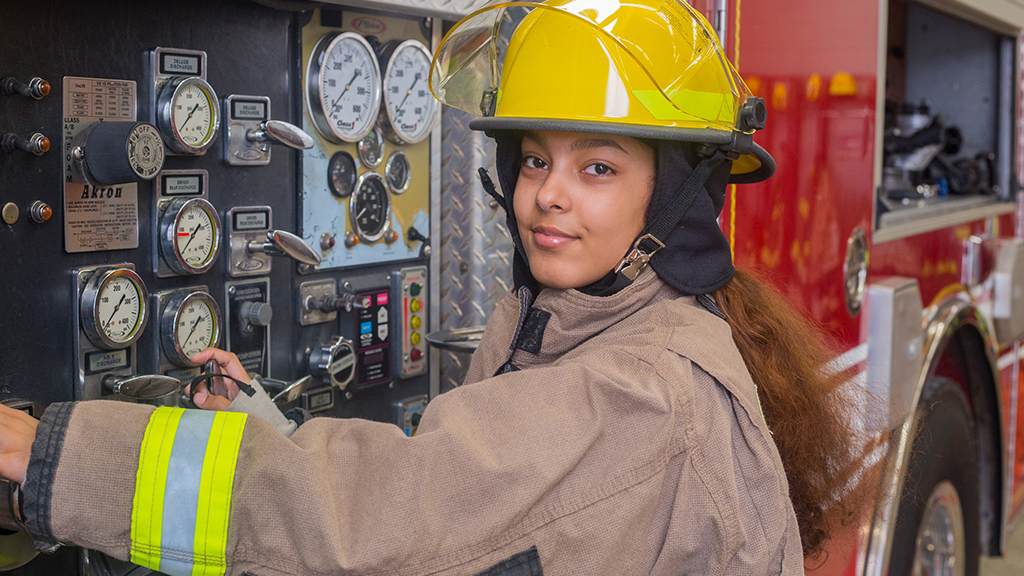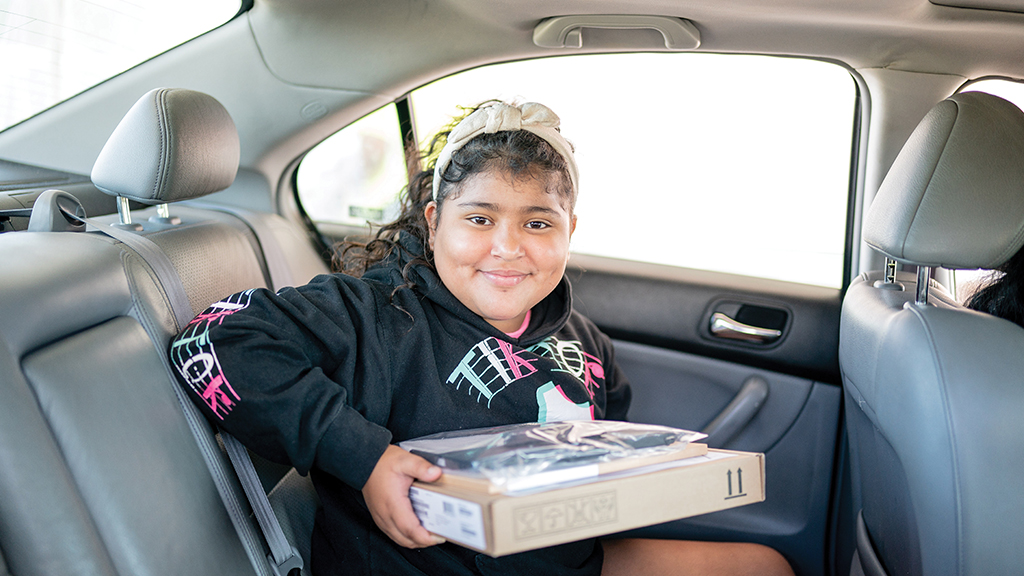Two school boards earned the 2021 Award for Urban School Board Excellence: South Carolina’s Richland County School District One and Tennessee’s Shelby County Schools. Created in 2004, the Council of Urban Boards of Education (CUBE) award recognizes urban school systems whose boards exhibit excellence in governance, a commitment to educational equity, success in raising academic achievement, and an ability to build civic capacity.
“It takes an intentional, strategic, and measurable movement to make a change in a district and create positive change in students’ lives,” said CUBE Steering Committee Chair Steve Gallon III. “I congratulate and thank Richland One and Shelby County for nourishing the well-being of their students and helping to ensure each student reaches their full potential for learning, loving, and lifelong success.”
Chip Slaven, NSBA’s interim executive director and CEO, added: “Richland One and Shelby County Schools exhibited strong leadership and strategic innovation in putting students’ needs first and providing access to programs and initiatives that will advance their learning and provide them with 21st-century skills that are important for their future success.”
The two districts were recognized at CUBE’s annual meeting in September in Atlanta.
Richland County School District One
The core values outlined in the strategic plan for South Carolina’s Richland County School District One guides the work of its board of school commissioners, says board Chair Aaron Bishop. In fact, the board’s reliance on those values—collaboration, equity, excellence, safety, courage, and compassion—has proved essential as it navigates the pandemic and continues to focus on growing opportunities and options for Richland One’s 22,000 students.
“Those core values kept us grounded, in a sense, while helping us take flight in the midst of the pandemic,” Bishop says. “They kept us connected to what we believe in as a team.”
What the team believes in “is making sure we provide equitable opportunities” for all, Bishop explains. “The challenge is making sure a rising tide lifts all boats.”
To lift all its students toward success, the district has put in place an expanding number of opportunities for students to grow academically, to find pathways toward college and career readiness, “and to find their voice,” says Superintendent Craig Witherspoon. “That’s what we’ve been about.”

A Richland One student enrolled in the firefighter training academy. Photo courtesy of Richland One.
Districts with demographics like Richland One—81 percent Black and other students of color and a 77 percent poverty index (based on various data points including the number of Medicaid and SNAP benefit recipients, and the homeless population)—don’t always have these creative and innovative opportunities for their students, Witherspoon adds. He points to the district’s foreign language immersion program, dual enrollment courses to earn both high school and college credit, and a first-in-the-state certified pre-apprenticeship program.
Located in Columbia, South Carolina’s state capital, Richland One stretches over 480 square miles, encompassing a mix of urban, suburban, and rural communities. As in many communities during the past two years, the pandemic became both a health crisis and a workforce crisis, Bishop says. Throughout the county, “there are parents who lost jobs or remain underemployed and are still trying to make ends meet.”
Community partner
The district had initiated trauma-informed practices well before the pandemic and turned to those skills as it reached out to students and families during the pandemic-related school closures. Board members also mobilized, working daily to support constituents. “On Sundays, we found ways to engage the faith communities to help us identify children so we could make sure none were lost,” Bishop says. Along with school resource officers, board members visited students’ homes. “It was not to investigate anything,” he says, “but just to be a community partner.”
The district’s outreach and support also included meal drop-offs and Wi-Fi enabled buses that parked in neighborhoods to provide internet access.
“There should be a greater outcry that in 2021 there are students who still don’t have reliable broadband access,” says Bishop.
Drilling Down, Student By Student
After returning to in-person learning in spring 2021, Richland One focused on countering learning loss and accelerating learning with a robust K-12 summer program and is continuing those efforts.
With in-person learning back in full force this fall, so is Richland One’s academic program. The nationally accredited school district’s Spanish, French, and Mandarin Chinese language immersion program helps prepare students to become self-confident learners and global citizens. Dual enrollment opportunities allow students to earn college credits while still in high school, saving thousands of dollars in tuition costs.
Richland One’s career and technical education program offers each of the 16 nationally recognized career clusters. Along with the pre-apprenticeship program, the district is preparing students for immediate job opportunities and advanced training in fields including transportation, distribution and logistics; automotive technology and diesel mechanics; firefighting; and health sciences. “We are not just an education system, but a workforce development system,” Bishop says.
Richland’s array of engaging education opportunities has helped the district reach its record-setting 85.8 percent graduation rate, topping the state average for three consecutive years.
Shelby County Schools
The school board for Tennessee’s Shelby County Schools firmly believes that to move a school district forward successfully, the governance team truly must understand the community’s wants, needs, and challenges.
In the city of Memphis, that means understanding the impact that poverty has in the daily life of the community and how that burden affects district classrooms, teaching, and learning. The Shelby board refuses to back away from the obstacles that poverty brings to building an innovative, high-achieving school district and remains committed to addressing those challenges head-on and providing the interventions needed. “We show up every day for our children, families, and staff,” says board Chair Miska Clay Bibbs.
The board’s strategic advocacy and execution on behalf of the 110,500-student school system, the largest in Tennessee and the 23rd largest in the nation, also was recognized with the CUBE Award in 2017 and 2020. Receiving a consecutive award in 2021 is particularly gratifying, Bibbs says, because it recognizes that “we have not moved our eyes and hands and hearts from understanding that we still have to serve students, regardless of what COVID is doing. We still have to take care of our kids’ education and health and safety, and our teachers and staff.”
Across the country, the pandemic reconfirmed that the nation’s schools are a vital lifeline in their communities. When school buildings and businesses closed due to the national health emergency, the Shelby board partnered with local agencies to raise money for families with outstanding utility bills as well as to provide weekly meal distributions to students. Although schools have fully reopened for in-person instruction, the district continues to address food insecurity in the region by providing meals to students who are in quarantine due to COVID-19 exposure.

A Shelby County Schools student receives the laptops that were distributed to all students as part of the district’s one-to-one digital device initiative to support educational equity and 21st century learning.
“This is important because we’re dealing with such a high percentage of families (48 percent) who are below the poverty line,” Bibbs says. But that doesn’t necessarily mean that the other 52 percent are doing well, she adds. Many “still are in need.”
Game Changer
As Shelby students prepared to begin the 2020-21 school year virtually, the district rolled out a “historic” one-to-one digital technology plan. The board’s decision to fund the 95,000-device purchase was not only “a game changer” in the district’s commitment to equity and ability to educate all students during remote learning, but it also laid the groundwork for a move toward more innovative, personalized 21st century teaching and learning.
“It just shifted the whole conversation” and is enabling the district to venture into blended learning, Bibbs says. An earlier pilot effort “didn’t necessarily hit the right way,” but much has been learned from that experience, she adds.
“As a board, we understand that teachers need additional support” in terms of professional development, blended-learning pedagogy, and administrative support to be successful with the hybrid learning model. “None of that would have happened had we not had the devices per child.”
Another game changer for the district was a policy change by the board in 2019 that revised the criteria for how kindergarten through second-grade students are promoted. Known as the Third Grade Commitment, the early literacy policy is designed to ensure that students reach reading readiness before the third grade.
District research showed that in 2018 three out of four students were not reading on grade level by third grade.
“The Third Grade Commitment pushes down and doubles down on the fact that we have to have a strong solid foundation for literacy,” Bibbs says.
Although implementation of the policy was delayed “for a bit just because we were doing COVID and pandemic response,” with the use of ESSER dollars “we are going into this school year able to get some assistants in classrooms to help support teachers build stronger foundations in preK to second grade.”
ACEs Awareness
Long before the pandemic, Shelby County Schools recognized that if it were to improve academic achievement in the district, it needed to understand and better support its children who are at greater risk for Adverse Childhood Experiences (ACEs). It’s documented that traumatic events, such as abuse, neglect, parental incarceration, and domestic violence, can have adverse, lasting effects on a child’s brain development, health, and behavior.
In response, all employees in the district, from classroom teachers to bus drivers to board members, have been trained in ACEs awareness. The district also has implemented trauma-responsive teaching and trauma-informed schools throughout the system to support affected students.
When the pandemic hit, “we really thought about the fact that we needed strong social-emotional and mental health support,” Bibbs says. Among the services it put in place: telephone hotlines for students and parents to contact school social workers and counselors around the clock for resources and assistance with social-emotional concerns. As school buildings reopened this fall, the district has made more resources available through its licensed mental health centers and ongoing work to ensure that student social-emotional health remains a district priority.

Share this content